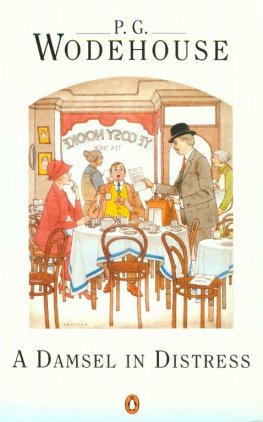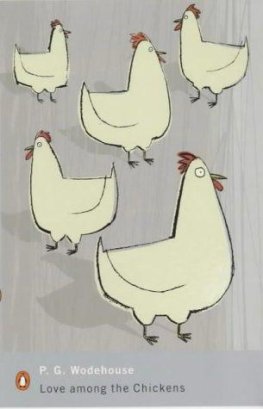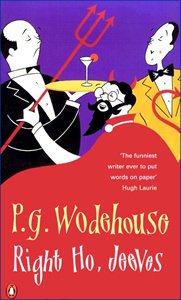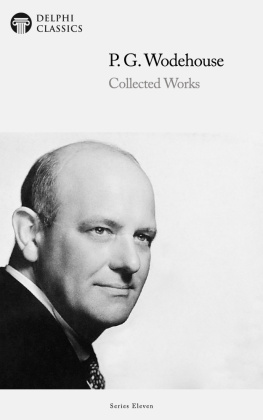Pelham Wodehouse - A Damsel in Distress
Here you can read online Pelham Wodehouse - A Damsel in Distress full text of the book (entire story) in english for free. Download pdf and epub, get meaning, cover and reviews about this ebook. year: 2001, publisher: Penguin Books; Reprint edition (July 3, 2001), genre: Prose / Humor. Description of the work, (preface) as well as reviews are available. Best literature library LitArk.com created for fans of good reading and offers a wide selection of genres:
Romance novel
Science fiction
Adventure
Detective
Science
History
Home and family
Prose
Art
Politics
Computer
Non-fiction
Religion
Business
Children
Humor
Choose a favorite category and find really read worthwhile books. Enjoy immersion in the world of imagination, feel the emotions of the characters or learn something new for yourself, make an fascinating discovery.
- Book:A Damsel in Distress
- Author:
- Publisher:Penguin Books; Reprint edition (July 3, 2001)
- Genre:
- Year:2001
- ISBN:014001599
- Rating:4 / 5
- Favourites:Add to favourites
- Your mark:
- 80
- 1
- 2
- 3
- 4
- 5
A Damsel in Distress: summary, description and annotation
We offer to read an annotation, description, summary or preface (depends on what the author of the book "A Damsel in Distress" wrote himself). If you haven't found the necessary information about the book — write in the comments, we will try to find it.
A Damsel in Distress — read online for free the complete book (whole text) full work
Below is the text of the book, divided by pages. System saving the place of the last page read, allows you to conveniently read the book "A Damsel in Distress" online for free, without having to search again every time where you left off. Put a bookmark, and you can go to the page where you finished reading at any time.
Font size:
Interval:
Bookmark:
A Damsel in Distress
by Pelham Grenville Wodehouse
Chapter 1
Inasmuch as the scene of this story is that historic pile, Belpher Castle, in the county of Hampshire, it would be an agreeable task to open it with a leisurely description of the place, followed by some notes on the history of the Earls of Marshmoreton, who have owned it since the fifteenth century. Unfortunately, in these days of rush and hurry, a novelist works at a disadvantage. He must leap into the middle of his tale with as little delay as he would employ in boarding a moving tramcar. He must get off the mark with the smooth swiftness of a jack-rabbit surprised while lunching. Otherwise, people throw him aside and go out to picture palaces.
I may briefly remark that the present Lord Marshmoreton is a widower of some forty-eight years: that he has two childrena son, Percy Wilbraham Marsh, Lord Belpher, who is on the brink of his twenty-first birthday, and a daughter, Lady Patricia Maud Marsh, who is just twenty: that the chatelaine of the castle is Lady Caroline Byng, Lord Marshmoretons sister, who married the very wealthy colliery owner, Clifford Byng, a few years before his death (which unkind people say she hastened): and that she has a step-son, Reginald. Give me time to mention these few facts and I am done. On the glorious past of the Marshmoretons I will not even touch.
Luckily, the loss to literature is not irreparable. Lord Marshmoreton himself is engaged upon a history of the family, which will doubtless be on every bookshelf as soon as his lordship gets it finished. And, as for the castle and its surroundings, including the model dairy and the amber drawing-room, you may see them for yourself any Thursday, when Belpher is thrown open to the public on payment of a fee of one shilling a head. The money is collected by Keggs the butler, and goes to a worthy local charity. At least, that is the idea. But the voice of calumny is never silent, and there exists a school of thought, headed by Albert, the page-boy, which holds that Keggs sticks to these shillings like glue, and adds them to his already considerable savings in the Farmers and Merchants Bank, on the left side of the High Street in Belpher village, next door to the Oddfellows Hall.
With regard to this, one can only say that Keggs looks far too much like a particularly saintly bishop to indulge in any such practices. On the other hand, Albert knows Keggs. We must leave the matter open.
Of course, appearances are deceptive. Anyone, for instance, who had been standing outside the front entrance of the castle at eleven oclock on a certain June morning might easily have made a mistake. Such a person would probably have jumped to the conclusion that the middle-aged lady of a determined cast of countenance who was standing near the rose-garden, talking to the gardener and watching the young couple strolling on the terrace below, was the mother of the pretty girl, and that she was smiling because the latter had recently become engaged to the tall, pleasant-faced youth at her side.
Sherlock Holmes himself might have been misled. One can hear him explaining the thing to Watson in one of those lightning flashes of inductive reasoning of his. It is the only explanation, my dear Watson. If the lady were merely complimenting the gardener on his rose-garden, and if her smile were merely caused by the excellent appearance of that rose-garden, there would be an answering smile on the face of the gardener. But, as you see, he looks morose and gloomy.
As a matter of fact, the gardenerthat is to say, the stocky, brown-faced man in shirt sleeves and corduroy trousers who was frowning into a can of whale-oil solutionwas the Earl of Marshmoreton, and there were two reasons for his gloom. He hated to be interrupted while working, and, furthermore, Lady Caroline Byng always got on his nerves, and never more so than when, as now, she speculated on the possibility of a romance between her step-son Reggie and his lordships daughter Maud.
Only his intimates would have recognized in this curious corduroy-trousered figure the seventh Earl of Marshmoreton. The Lord Marshmoreton who made intermittent appearances in London, who lunched among bishops at the Athenaeum Club without exciting remark, was a correctly dressed gentleman whom no one would have suspected of covering his sturdy legs in anything but the finest cloth. But if you will glance at your copy of Whos Who, and turn up the Ms, you will find in the space allotted to the Earl the words HobbyGardening. To which, in a burst of modest pride, his lordship has added Awarded first prize for Hybrid Teas, Temple Flower Show, 1911. The words tell their own story.
Lord Marshmoreton was the most enthusiastic amateur gardener in a land of enthusiastic amateur gardeners. He lived for his garden. The love which other men expend on their nearest and dearest Lord Marshmoreton lavished on seeds, roses and loamy soil. The hatred which some of his order feel for Socialists and Demagogues Lord Marshmoreton kept for roseslugs, rose-beetles and the small, yellowish-white insect which is so depraved and sinister a character that it goes through life with an aliasbeing sometimes called a rose-hopper and sometimes a thrips. A simple soul, Lord Marshmoretonmild and pleasant. Yet put him among the thrips, and he became a dealer-out of death and slaughter, a destroyer in the class of Attila the Hun and Genghis Khan. Thrips feed on the underside of rose leaves, sucking their juice and causing them to turn yellow; and Lord Marshmoretons views on these things were so rigid that he would have poured whale-oil solution on his grandmother if he had found her on the underside of one of his rose leaves sucking its juice.
The only time in the day when he ceased to be the horny-handed toiler and became the aristocrat was in the evening after dinner, when, egged on by Lady Caroline, who gave him no rest in the matterhe would retire to his private study and work on his History of the Family, assisted by his able secretary, Alice Faraday. His progress on that massive work was, however, slow. Ten hours in the open air made a man drowsy, and too often Lord Marshmoreton would fall asleep in mid-sentence to the annoyance of Miss Faraday, who was a conscientious girl and liked to earn her salary.
The couple on the terrace had turned. Reggie Byngs face, as he bent over Maud, was earnest and animated, and even from a distance it was possible to see how the girls eyes lit up at what he was saying. She was hanging on his words. Lady Carolines smile became more and more benevolent.
They make a charming pair, she murmured. I wonder what dear Reggie is saying. Perhaps at this very moment
She broke off with a sigh of content. She had had her troubles over this affair. Dear Reggie, usually so plastic in her hands, had displayed an unaccountable reluctance to offer his agreeable self to Maudin spite of the fact that never, not even on the public platform which she adorned so well, had his step-mother reasoned more clearly than she did when pointing out to him the advantages of the match. It was not that Reggie disliked Maud. He admitted that she was a topper, on several occasions going so far as to describe her as absolutely priceless. But he seemed reluctant to ask her to marry him. How could Lady Caroline know that Reggies entire worldor such of it as was not occupied by racing cars and golfwas filled by Alice Faraday? Reggie had never told her. He had not even told Miss Faraday.
Perhaps at this very moment, went on Lady Caroline, the dear boy is proposing to her.
Lord Marshmoreton grunted, and continued to peer with a questioning eye in the awesome brew which he had prepared for the thrips.
One thing is very satisfactory, said Lady Caroline. I mean that Maud seems entirely to have got over that ridiculous infatuation of hers for that man she met in Wales last summer. She could not be so cheerful if she were still brooding on that. I hope you will admit now, John, that I was right in keeping her practically a prisoner here and never allowing her a chance of meeting the man again either by accident or design. They say absence makes the heart grow fonder. Stuff! A girl of Mauds age falls in and out of love half a dozen times a year. I feel sure she has almost forgotten the man by now.
Font size:
Interval:
Bookmark:
Similar books «A Damsel in Distress»
Look at similar books to A Damsel in Distress. We have selected literature similar in name and meaning in the hope of providing readers with more options to find new, interesting, not yet read works.
Discussion, reviews of the book A Damsel in Distress and just readers' own opinions. Leave your comments, write what you think about the work, its meaning or the main characters. Specify what exactly you liked and what you didn't like, and why you think so.







